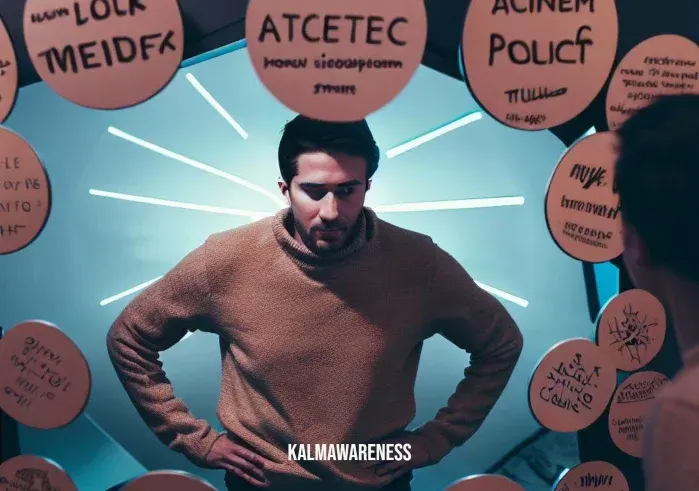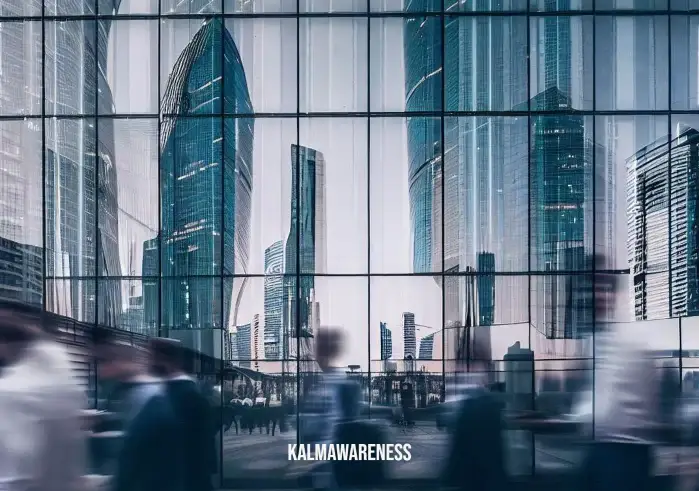Unraveling the Mirror Effect: The Intricate Relationship Between Perception, Behavior, and Personal Growth
How does our perception shape our behavior and contribute to personal growth? To fully comprehend this, we need to first understand a psychological phenomenon known as the ‘Mirror Effect’. So, what is mirror effect? The mirror effect is a theory suggesting that we perceive and interpret the actions of others as a reflection of ourselves, often leading to either negative or positive feedback loops.
The Interplay of Perception and Behavior
In the realm of psychology, perception, and behavior are intimately linked. Our perception of experienced pain, for example, can greatly influence our behavior. If we perceive an experience as painful, we’re likely to avoid similar situations in the future. On the flip side, if we associate an experience with pleasure or satisfaction, we tend to seek out similar situations. This demonstrates how perception influences behavior, but what about the reverse?
Research suggests that our behavior can also shape our perceptions. This is especially evident when we look at mindful behavioral solutions. By consciously changing our behavior, we can alter our perceptions and attitudes, leading to a more positive and productive mindset.
Reflecting on the Mirror Effect
“We do not see things as they are, we see them as we are.” – Anaïs Nin
This insightful quote encapsulates the essence of the mirror effect. The theory postulates that our judgments and perceptions of others are, in fact, projections of our self-perceptions. This is often seen in situations where people stare at phones or in social circumstances where one’s actions are being judged.
However, the mirror effect isn’t always about external reflection; it can also be about self-reflection. How we see ourselves in the mirror can significantly impact our mental and emotional state. For instance, when you look in the mirror, what do you see? Do you focus on your flaws or appreciate your unique qualities? Recognizing and altering these internal reflections is key to personal growth.
The Mirror Effect in Personal Growth
So, how does the mirror effect contribute to personal growth? Firstly, it helps us recognize and accept our flaws. Once we’ve identified these areas of improvement, we can employ techniques like meditation for negative thoughts and mindful behavior to create positive changes.
Secondly, the mirror effect enhances our empathy and understanding towards others. By realizing that our perceptions of others are often a reflection of ourselves, we can become more accepting and less judgmental. Our blog post on Judgemental Duck illustrates this concept beautifully.
Finally, the mirror effect encourages introspection and self-awareness, which are vital components of personal growth. As we become more self-aware, we’re better equipped to navigate the challenges of life, leading to greater satisfaction and happiness.
This part of the article introduces you to the concept of the mirror effect and its role in perception, behavior, and personal growth. In the next section, we’ll delve deeper into how you can utilize the mirror effect to foster personal growth and enhance your life. We’ll explore a variety of techniques such as grounding into gratitude, mindful behavior, and more. Continue reading to learn how you can leverage this intriguing psychological phenomenon for a more fulfilled life.

Harnessing the Power of the Mirror Effect: Strategies for Personal Growth
The mirror effect, as we learned, is a potent psychological phenomenon that can significantly influence our perception, behavior, and personal growth. But, how can we harness this power to positively transform our lives? Let’s delve into a few practical strategies that can help us utilize this effect more effectively.
Reframing Negative Thoughts
One key aspect of understanding the mirror effect is realizing that our negative thoughts often reflect our inner fears and insecurities. For instance, if you find yourself constantly bothered by others’ actions, it could be a projection of your insecurities. Try to examine why these actions bother you. Do they mirror an aspect of your personality that you’re uncomfortable with? Reframing these negative thoughts can help us break free from these destructive patterns. The article on “Bothering Me” offers more insights into this topic.
Practicing Mindfulness
Practicing mindfulness can be another effective strategy. Mindfulness encourages us to stay present and non-judgmental, which can help us see others (and ourselves) in a more objective light. Practicing mindfulness techniques, such as Dalai Lama meditations, can help us improve our self-awareness and reduce the intensity of the mirror effect.
Shifting Perspective
Sometimes, a shift in perspective can be all it takes to reduce the impact of the mirror effect. Take a moment to consider: When I look in the mirror, do I focus more on my flaws than my strengths? If the answer is yes, it might be time to shift your perspective. Start recognizing and celebrating your strengths and accomplishments, and you might find your self-perception (and thus, your perception of others) begins to change.
Encouraging Authentic Self-Expression
Authentic self-expression is a powerful tool for combating the negative aspects of the mirror effect. By expressing ourselves authentically, we foster a more accurate and positive self-image. This can translate into a more balanced view of others, reducing the tendency to project our insecurities onto them. Check out our article on authentic questions for more on this.
To visualize the impact of these strategies, let’s consider them in the form of a table:
| Strategy | Description | Link |
|---|---|---|
| Reframing Negative Thoughts | Examining and altering our negative thoughts to reduce projection of insecurities | Bothering Me |
| Practicing Mindfulness | Enhancing self-awareness and objectivity through techniques like meditation | Dalai Lama meditations |
| Shifting Perspective | Focusing more on strengths and achievements rather than flaws to alter self-perception | Look in the mirror |
| Encouraging Authentic Self-Expression | Fostering a positive and accurate self-image to reduce projection onto others | Authentic Questions |
In the next chapter, we’ll explore some of the potential challenges associated with the mirror effect, along with ways to overcome them. We’ll also discuss how the mirror effect ties in with other psychological concepts and theories. So, continue reading to deepen your understanding of this fascinating topic and discover how you can apply these insights to enhance your personal growth journey.

Challenges of the Mirror Effect and Overcoming Them
Understanding what the mirror effect is and how it influences our behavior is a crucial part of personal growth and self-awareness. However, recognizing its presence in our lives and learning how to navigate its challenges can sometimes be difficult. In this section, we will explore some of these challenges and provide useful solutions to help you conquer them.
Recognizing the Mirror Effect in Relationships
Relationships can often be a breeding ground for the mirror effect. It’s common for us to see our own traits, both positive and negative, reflected in our partners. But sometimes, it’s hard to recognize this mirror effect in our relationships. To navigate this, it’s essential to practice introspection and ask ourselves questions like, “Am I marrying the right person?” or “Am I with the wrong person?”. These questions can help us uncover unconscious patterns and understand how the mirror effect might be influencing our relationship decisions.
Distorted Self-Image
The mirror effect can sometimes lead to a distorted self-image, especially when we’re unable to accept certain aspects of ourselves. This can manifest in different ways, such as not recognizing oneself in the mirror. When you look in the mirror and don’t recognize yourself, it might be a sign of this distortion. To combat this, cultivating self-acceptance and self-love is key. As the Dalai Lama wisely said, “We can never obtain peace in the outer world until we make peace with ourselves.” For more tips on cultivating self-love, you can refer to the “Dalai Lama daily prayer”.
Managing Negative Projections
At times, the mirror effect can result in us projecting our negative traits onto others. We might find ourselves attributing our insecurities or flaws to those around us, especially in situations where we feel judged or threatened. As the saying goes, “We do not see things as they are, we see things as we are.” To address this, the practice of mindfulness can be immensely helpful. By grounding ourselves in the present and observing our thoughts and emotions without judgement, we can better understand and manage our projections. The article “Meditation for Negative Thoughts” provides useful strategies to do this.
In the following chapter, we will delve into more complex aspects of the mirror effect, discussing how it can influence our societal interactions and exploring potential positive impacts. We’ll also look at some real-life examples of how the mirror effect works in different contexts, including both personal and professional settings. Continue reading to deepen your understanding of the mirror effect and discover how to harness its power for positive change.

The Mirror Effect: Harnessing its Power
The mirror effect, while often considered a challenge to navigate, can also be a powerful tool for personal growth and societal change when harnessed properly. In this chapter, we’ll discuss how to leverage the mirror effect to foster self-understanding and contribute to positive social dynamics. We’ll also share some inspirational quotes that can offer hope and confidence in this journey.
Self-Reflection and Personal Growth
The first step to leveraging the mirror effect for personal growth is active self-reflection. When you look into the mirror literally or figuratively, what you see is a reflection of your inner self. By consciously observing your reactions to other people’s behaviors, you can uncover hidden aspects of your own personality and work on them. By understanding how we perceive others, we can better understand ourselves and chart our path to personal growth.
Furthermore, Carl Rogers, one of the founders of humanistic psychology, emphasized the importance of congruence or authenticity in personal growth. A greater congruence between our self-image and ideal self leads to a healthier self-concept and overall personal growth. You can read more about his approach to personal growth here.
The Mirror Effect and Societal Change
On a societal level, the mirror effect can be a powerful force for change. When we reflect positive behaviors, attitudes, and values, we encourage others to do the same. This concept is brilliantly explained in the blog post about people’s actions being a reflection of themselves.
The mirror effect has far-reaching implications for social dynamics and cultural change. Let’s look at this in a bit more detail using the following table:
| Context | Mirror Effect Application | Potential Outcome |
|---|---|---|
| Workplace | Embodying positive work ethics and values | Improved team dynamics and productivity |
| Education | Teachers modeling desired behaviors | Increased student engagement and learning |
| Family | Parents reflecting healthy communication styles | Improved family relationships and child development |
| Society | Public figures exemplifying good character | Cultural shift towards those values |
| Self | Reflecting on personal behavior | Increased self-awareness and personal growth |
As Bertrand Russell once said, “The good life is one inspired by love and guided by knowledge.” Navigating the mirror effect can be a lifelong journey of learning, growth, and love. Our next chapter will delve into how the mirror effect works in specific settings such as workplaces, families, and educational institutions. We’ll explore case studies and practical steps you can take to use the mirror effect to foster positive change. So, stay tuned!

The Mirror Effect: Influencing Behaviors and Emotions
The mirror effect is more than just a psychological concept; it is a phenomenon that significantly impacts our behavior, emotions, and social interactions. Whether we are conscious of it or not, the mirror effect silently governs how we perceive ourselves and others.
Shaping Personal Behavior
Personal behaviors are shaped heavily by the mirror effect. In other words, the way we view ourselves is often a reflection of how we perceive others to be viewing us. This phenomenon is discussed in detail in the article why do I not recognize myself in the mirror?
The mirror effect also plays a critical role in behavior change. Hacking the habit loop offers valuable insights into how understanding the mirror effect can aid in breaking bad habits and forming new, positive ones.
Affecting Emotions
The mirror effect also influences our emotional state. It’s often said that emotions are contagious, and this is particularly true when it comes to mirroring. We subconsciously absorb and reflect the emotions of those around us, which can have a profound impact on our own emotional state. This mirroring of emotions can lead to a stronger sense of empathy, as explained in the article is curious an emotion?
Furthermore, the mirror effect can influence the way we process negative emotions. For instance, practicing meditation for negative thoughts can help us realize that our reactions to others’ negative emotions are often a reflection of our own insecurities and fears.
Impact on Social Interactions
The mirror effect is integral to social interactions. It helps us understand and respond to others, fostering empathy, cooperation, and social cohesion. However, it also has the potential to lead to social misconceptions. The article on psychological misconceptions provides a deep-dive into how the mirror effect can sometimes lead us astray in our understanding of others.
In the realm of technology and social media, the mirror effect takes on an even more significant role. As we increasingly communicate through digital platforms, the article people staring at phones discusses how the mirror effect shapes our online interactions and perceptions of ourselves and others.
To conclude, the mirror effect is a pervasive influence in our lives, shaping our behaviors, emotions, and social interactions. By understanding and consciously utilizing this psychological phenomenon, we can enhance our self-awareness, foster healthier relationships, and facilitate personal growth. Stay tuned for our next chapter where we will explore further dimensions of the mirror effect, delving into its impact in areas such as the workplace, education, and more.

The Mirror Effect: Reflections for a Better Future
As we draw closer to the end of our exploration of the mirror effect, it is essential to ponder on the role this psychological phenomenon plays in shaping our future. The mirror effect, or reflective mimicry, holds the power to not only influence individual behavior and emotional responses but also to potentially mold societal patterns and expectations. Remember, the exploration doesn’t stop here, our library of articles provides you with an ocean of knowledge on various aspects of psychology, and we look forward to guiding you on more such insightful journeys.
Mirror Effect in Leadership
Leadership has a significant influence on the culture of any organization or community. The mirror effect in this context refers to how leaders’ attitudes and behaviors reflect upon their followers. It reinforces the importance of positive leadership in cultivating a nurturing and progressive environment. Our article Leadership and the Power of Influence expands more on this idea and provides practical tips for leaders to harness this phenomenon for positive change.
The Role of Education
Education plays a pivotal role in the shaping of minds. The reflection phenomenon plays out in classrooms and lecture halls across the world. A piece titled Creating Positive Classroom Environments delves into strategies that educators can employ to utilize the mirror effect for creating more conducive learning environments.
Inspiring Social Change
Can the mirror effect inspire social change? Absolutely! Understanding how our actions and emotions can resonate with and influence others is a powerful tool for social transformation. Inspiring Change Through Positive Actions delves deeper into this topic, showing how a simple act of kindness can create a ripple effect, mirroring positivity, and promoting societal growth.
Looking Towards the Future
The power of the mirror effect extends to our visions for the future. By understanding this phenomenon, we can influence our thoughts and actions to create a more positive reflection of our aspirations. The article Visualizing a Better Tomorrow provides strategies for leveraging the mirror effect for a better future.
As we conclude our exploration of the mirror effect, we hope you walk away with a new lens through which to view your interactions and influences in the world. Remember, like a mirror, our actions and emotions reflect back onto us, shaping our perceptions and experiences.
Thank you for joining us on this enlightening journey into the mirror effect. We encourage you to continue exploring the fascinating world of psychology through our other articles and look forward to welcoming you back to our magazine. Remember, every new day brings an opportunity to learn and grow, and the exploration of the human mind and its various aspects is an eternal journey.




